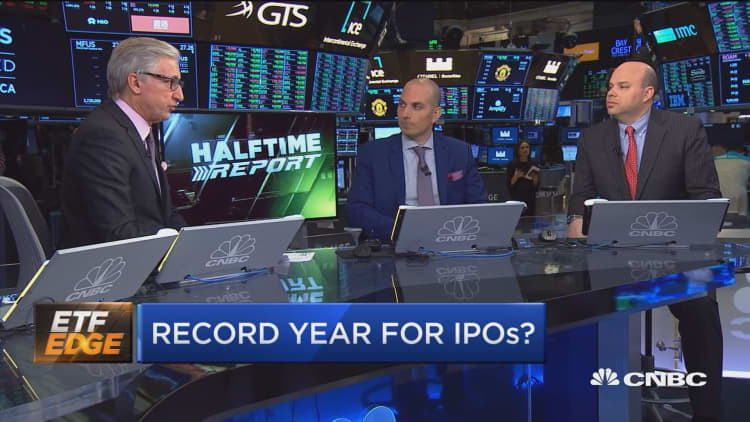Uber, Lyft, Airbnb and Pinterest: These are just a few of the companies eyeing the public markets this year.
And while now considered household names, financial experts say that doesn't necessarily mean you should buy.
Ride-hailing company Lyft filed its IPO prospectus on Friday, following reports that it expects to be valued between $20 billion and $25 billion. The company's filing showed it had $911 million in losses and $2.1 billion in revenue last year.
Experts say you should still proceed with caution if you're thinking of getting in on this deal or any of the other upcoming high-profile IPOs.
More from Advisor Insight:
Prepare your heirs for the $68 trillion 'great wealth transfer'
Why some advisors are moving to shield the elderly from fraud
Has your broker or advisor landed on FINRA's 'bad guy' list?
People need to ask themselves whether they consider Lyft a technology stock, a transportation stock or a platform, said financial advisor David W. Karp, co-founder of independent wealth specialist firm PagnatoKarp in Reston, Virginia. "It may be a combination of all three of them, and then you have to decide what kind of valuation it should command," he said.
While these companies' industries may grow, it remains to be seen whether they will do so profitably, Karp added.
"People fall in love with a service or a product or a platform," Karp said. "We've seen throughout history that great services, great products don't necessarily make great businesses."
Not all IPOs are successful
The earnestness to get into high-profile IPOs is often prompted by memories of other big-name companies that investors wish they had invested in, said certified financial planner Douglas Boneparth, president and founder of Bone Fide Wealth.
Take Google, for example. The company's 2004 IPO raised more than $1.8 billion. What it also did was make many of its shareholders richer, particularly if they held on to their stock.
"Generally speaking, [IPOs] don't do all that well," Boneparth said. "But people tend to think of the ones that have done really well.
"You can point to many more unsuccessful IPOs than you can point to successful IPOs."
If you do decide you want to invest, you should do your due diligence, Boneparth added. A company's Form S-1 filed with the SEC will disclose all of its financial details and the risks it identifies for its business going forward.
"Ultimately, you want to know how the company makes its money, how it plans to continue making money [and] how it plans to grow its businesses or core business," Boneparth said.
You should also take a look at your own balance sheet, including how much you can realistically afford to invest in the company and whether you will be willing to stay invested if the stock plummets, said Winnie Sun, founder of Sun Group Wealth Partners.
"I like to do a wait-and-see before jumping into the holding," Sun said of a company's first couple of weeks of trading. "We let the stock kind of come to our price versus chasing the stock itself."
Not the IPO market of 2000
Today's IPO market is different from that of 2000 — the height of the dot-com boom — in one notable way: the proliferation of exchange-traded funds since that time, according to Todd Rosenbluth, senior director of ETF and mutual fund research at CFRA, an independent investment research firm.
Of note, Renaissance Capital offers an IPO ETF, which adds companies of a certain size that list on the public markets. Companies are dropped from the ETF once they have been public for two years.
"It's a way of getting diversified exposure to companies that become public," Rosenbluth said.
While Renaissance is one of the few companies offering such an ETF strategy, that could change, according to Rosenbluth.
"Perhaps as we see more companies becoming public, we'll see asset managers want to offer an ETF experience," he said.

Another company, iBillionaire, has launched a new strategy aimed at helping investors put money in IPO-ready companies, including Pinterest, Uber, Lyft, Postmates and Slack. Called the IPO PULPS Strategy after those companies, it currently offers access to recently listed public businesses, such as Shopify, Spotify and Eventbrite.
"This strategy is higher risk," iBillionaire states on its website, "and we do not recommend investing more than 10 percent of your total portfolio in IPO PULPS."
But investors might be wise to watch for a different, higher hurdle before adding a newly public company to their portfolios, according to Rosenbluth. That is when the company eventually makes its way to the S&P 500 Index.
While that can take years, it is an indication of sustained performance, Rosenbluth said.





